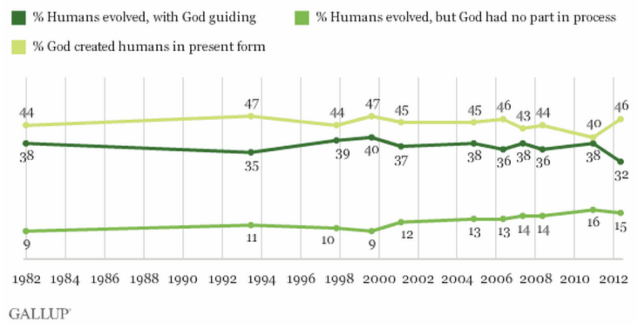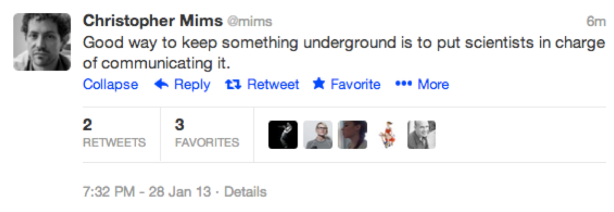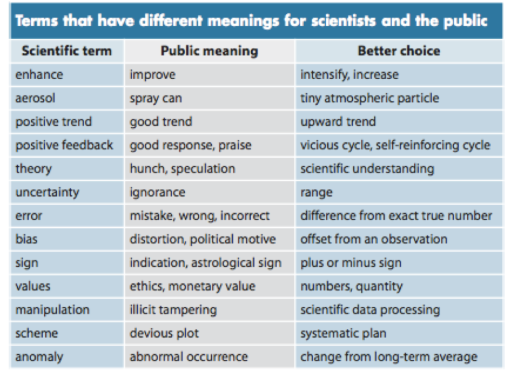
10 Reasons the planksip Journalist Program is Perfect for a Science Writer
In the mid-1970s, Science editor, Allen Hammond, took a calculated risk. Instead of relying on the same mediocre generalists to cover science news, he started hiring PhDs. He reasoned that the scientific experts could learn to write and write better science stories.
Before long, articles about organ transplants, pollution, and recombinant DNA captured the public imagination. During the 1980s and 1990s, a "golden age" of science writing burgeoned. Then, along came the internet.
Within a matter of years, the ecology of traditional science journalism dried up.
What do I mean by dried up? In 1989, there were 95 American newspapers with weekly science news sections. By 2012, that number dropped to just 19.

Fortunately, that's not the whole story when it comes to science writing and the internet. Let's take a closer look at how the internet continues to reshape science writing, providing exciting, non-traditional platforms such as planksip for budding authors.
The Brave New World of the Science Writer
Plenty of nostalgia surrounds the so-called "golden age " of science writing in the 1980s and 1990s. And it's true that if you were a science writer at the time, you would have undoubtedly experienced a freefall with the advent of the internet.
While the internet took away many professional outlets for journalists, it replaced them a thousandfold. Today, there has never been a broader landscape for science writers and content curators.
These journalists and scientists populate a brave new world of blogs, websites, e-publications, and even print issues about science. However, it's worth noting that when we talk about science writing today, it involves more than merely putting words on paper.
As content creators, science writers generate a wide array of materials, from "whiteboard" lectures to podcasts, animations, slide shows, and more. In other words, if you know where to look, opportunities prove both interactive and endless.
Finding Your Way and Making Money
Trying to find your way (while making money) amid these opportunities can prove tricky. There have never been more places to write about science. Yet, it's also more challenging to find well-paid, stable positions.
What's more, the internet has blurred the lines between public information, independent journalism, public relations, and private interest. What to do?
Instead of ruminating over the lost ecosystem of the 1980s and the 1990s, find your community and start producing the kind of peer-reviewed work that garners attention and a steady paycheck. That's where planksip's Science Journalism Program comes into play.
Let's explore how this platform is revolutionizing how science writers interact, publish work, and receive compensation.
Utilizing a Surefire Platform for Success
Instead of perceiving the internet as the destructor of quality science journalism, you must explore the opportunities that have emerged. That said, not all of these opportunities are created equal. As Hamlet once put it, "Ay, there's the rub."

Plenty of platforms underpay writers. And, as freelance positions, they lack stability, leaving writers to live pitch to pitch. This system can make science writers feel at odds with one another, vying for the same few breadcrumbs.
How do you find a site where you can write about philosophy, biology, quantum physics, and more while earning money? How do you build a network of like-minded colleagues along the way? Innovative platforms like planksip provide the answer.
At planksip, you'll peer review and rank one another's work. As your writing improves and you garner more considerable attention from your peers, you'll also have the opportunity to receive high-level compensation.
If you're longing to test your dynamic ability and thrive in the chaos of harmonic structures, there's no better place. Let's explore ten reasons why it might be right for you.
1. Stand on the Shoulders of Giants
From why volcanoes explode to how neurons fire, you've learned it all. But do you understand what science writers actually do?

It's time to take the advice of Sir Isaac Newton by "standing on the shoulders of Giants." Nothing happens in a vacuum. The same goes for developing fantastic science writing skills.
Start by reading their work. Devour literature reviews, recent journal articles, and publications such as the Science Writers' Handbook.

Don't neglect online science articles, either. Writing for the internet represents a different ballgame. Articles tend to be shorter (anywhere between 500 to 1,000 words), yet they must be relevant, highly readable, and uber-engaging. Then again, who am I to say? You will be judged by your peers, not me.
Mastering digital science writing means following and emulating the work of others. A platform such as planksip facilitates this real-world education through peer review and digital publication.
2. Embrace a Self-Correcting Process

Carl Sagan got it right when he noted, "Science is a self-correcting process. To be accepted, new ideas must survive the most rigorous standards of evidence and scrutiny."
When it comes to making it as a science writer, your work must also stand up to these rigorous standards. That's why the peer review process remains so critical to growth and development in the field. So does constructing a network of colleagues.
Planksip puts you on the fast track when it comes to networking and embracing a self-correcting process. It will help you forge valuable relationships essential to your success as a science writer.
3. Take the Strange and Make It Familiar
Reading the work of others and building a network of colleagues will only take you so far when establishing a career as a science writer. Most importantly, you must get in the trenches and start writing.
Science writing, like other forms of writing, requires copious amounts of practice. It also requires what Carl Zimmer refers to as "deprogramming."
It’s a daunting time to be a professional science writer. Science, it seems, is working too well. As Carl Zimmer told an auditorium full of science graduate students, “It’s hopeless to cover it all, and it’s only getting worse.”
Or as an exasperated Ed Yong put it:

This point in the history of science represents an embarrassment of riches – exciting discoveries are made every day, but there aren’t enough people to take scientific reports and craft them into stories that non-scientists understand and actually want to read. As Zimmer told those of us gathered in the auditorium of Yale’s Peabody Natural History Museum, “Let’s not restrict the wealth to this room.”
There is, in fact, a world outside of our departments, and there’s a lot at stake out there.
Nearly half of Americans believe that humans were created in their present form by God within the past 10,000 years. The percentage of Americans who hold a hard-line Creationist view of the world has been flat for the past 30 years, despite major the gains science has made in understanding our human origin, including sequencing of the human and chimp genomes. The mounting scientific evidence that humans and chimps evolved from a common ancestor ~5-7 million years ago has failed to make those data points budge. Consequently, Americans still debate what place human evolution has in the classroom. Similarly, evidence of a 150-year trend in rising global temperatures hasn’t stopped people from pointing to a cold winter’s day as a refutation of climate change.
The public policy that will determine what we teach our kids and how we deal with climate change will hinge on whether or not voters understand the scientific method, or at least value scientific evidence. Scientists can’t afford to discuss amongst themselves and grumble about how the public doesn’t get it. Fortunately, if the attendance at Carl Zimmer’s writing workshop is any indication, scientists are looking to add their voices to the public discourse. If not to increase science literacy then, heck, to at least share the exciting things happening in their labs with family and friends. Scientists can chip in to cover “all the amazing papers”, lest Ed Yong sends himself to an early grave.
So great, we have scientists who are onboard and want to deliver science to the public. One problem: scientists, we’re told, are pretty bad at communicating science.
Take this tweet from Quartz News tech/science journalist Christopher Mims, posted that very same afternoon:
Or consider this quote about scientists-as-writers from Robert Kunzig from “Gee Whiz Science Writing” in A Field Guide for Science Writers:
It was sometimes almost sweet, how incompetent they were- how unable to offer a clear, logical account of their work that would be understandable and interesting to an intelligent layperson.
I read this passage on the eve of the writing workshop. It fell under the subheader “Don’t Be Afraid” and it was aimed at convincing science journalists that they shouldn’t be intimidated by egg-headed scientists. As an egg-headed scientist it left me feeling, well, intimidated at the prospect of a professional writer ever reading my own attempts at science writing.
But here was acclaimed science writer Carl Zimmer telling us that we too could learn to be effective writers. It would just require a bit of “deprogramming”. The thing is, scientists sometimes forget to speak English. As students we put in a lot of effort to learn the scientific language, or jargon, of our fields – terms like “synaptic plasticity” or “epigenetics” encapsulate a textbook worth of material. We embraced jargon because we earned the right to use it, and as Zimmer said it, we wanted to “sound like the grownups”.
Jargon is super convenient when experts wish to convey concepts quickly among themselves, but it’s also a sure-fire way to make the eyes of non-scientists glaze over faster than you can say “Krispy Kreme”. First and foremost, scientists need to dispense with scientific lingo when they write for the public. Some jargon is easy to spot, like “RNA interference”. However, scientists sometimes have “jargony” uses for everyday English words that are confusing to lay readers. I thought this table from “Communicating the science of climate change” by Richard Somervile and Susan Hassol was an eye-opener.
Instead of jargon, scientists should find metaphors that bring concepts to life and help readers get an intuitive sense of the science. A spot-on metaphor or figure of speech doesn’t exclude readers, but like jargon it quickly conveys a complex concept. Zimmer pointed out, “our brains are built for metaphors”. To avoid “in-speak” scientists need to place themselves in the mind of a non-scientist, which requires a forgetting of sorts. Think: what did words mean before science colored them? Zimmer keeps a running log of banned words in science writing that you can refer to. I’m guilty of relying on “forbidden” words like modulate and elucidate, among others.
Zimmer said he’s noticed that jargon is leaky, often seeping out into surrounding sentences. That is, scientists tend to write in overly formal language. A real-life example he used was the graduate student who wrote that flu spreads in “household settings”. Another bad habit of scientists is that they often use the passive voice. I think this happens for two reasons: 1) scientists are typically modest and sometimes feel like saying I or we did/found X sounds arrogant 2) scientists aim to be unbiased; when the passive voice is used in scientific articles it’s as if to say “any person who followed the stated protocol would have found the same results”. However, when passive voice creeps into non-academic writing, it can leave the reader with the impression that phenomena unfolded without any apparent cause.
 Once a scientist unlearns his or her bad habits, the next step is to practice the craft of story building. Zimmer said that when we look at a beautiful piece of architecture, what we appreciate is how the craftsmanship at different scales work together. In writing, the craft starts with word selection and scales up to the paragraphs and overall structure of the story. Like a building, we can take apart the elements of a story and figure out how it was constructed and what makes it compelling. If you want to learn how to write a magazine article, reverse engineer a magazine article.
Once a scientist unlearns his or her bad habits, the next step is to practice the craft of story building. Zimmer said that when we look at a beautiful piece of architecture, what we appreciate is how the craftsmanship at different scales work together. In writing, the craft starts with word selection and scales up to the paragraphs and overall structure of the story. Like a building, we can take apart the elements of a story and figure out how it was constructed and what makes it compelling. If you want to learn how to write a magazine article, reverse engineer a magazine article.
Zimmer said that before starting, you should be able to state your story in ten words or less. If you can’t, you don’t know what you’re writing about yet. The introduction should provide a road map for the journey you’ll take the reader on. The end of the story can look towards the future, “What are the implications if this finding holds up?” Stories, scientific ones included, are about people doing things – so bring the players to life. Also, writers should make sure to orient the reader throughout the story, especially if the piece jumps around in time. Finally, don’t be afraid to read your writing out loud. The most enjoyable writing flows naturally and takes on the cadence of speech.
Scientific trainees spend much more time wielding pipettes than wielding pens. Yet, the ability to write clearly for a lay audience is vital if scientists want to inform public opinion on issues ranging from food production to climate change. At a time of looming budget cuts, scientists need the support of the public. We should be seeking to communicate how our science can improve lives, whether that means finding new energy sources or simply providing people with a “gee whiz” science moment. We might need to unlearn some habits in order to do it, but scientists can help spread the wealth of science to the public.
Zimmer’s workshop laid out specific tools and guidelines to start the process, but it will take a lot of work from there. Luckily, as scientists we already possess something that’s key to good story-telling, and that’s enthusiasm. Former science editor for The Guardian Tim Radford wrote:
Most scientists start with the engaging quality of enthusiasm — to get through a degree course, the PhD and all the research-council hoops, you would need it…Enthusiasm is infectious, but to command an audience of readers, scientists should exploit their other natural gifts. One of these is training in clarity. Another is training in observation. And a third is knowledge.
I’ll keep these words in mind as I work to put Zimmer’s writing advice into practice.
What does Zimmer mean? It's time to get real for a minute.
Scientists sometimes forget how to speak English. They get so caught up in scientific jargon and language that they leave the readers behind. Miles behind.
Sure, jargon is convenient in conversations among colleagues. But when it comes to effectively communicating scientific discoveries and ideas to the public? You must cultivate an accessible voice.
As George Johnson of the New York Times put it, "Take the strange and make it familiar." How do you develop this ease of jargon-free communication? By writing every single day.
With planksip, you'll gain the motivation you need to make writing a daily practice. The platform's network of authors and competitive peer-review model will push you to achieve your best work.
4. Learn to Write for Your Audience
Only through practice will you hone the ability to translate a scientist's work into metaphors and analogies that speak to readers. And the audience means everything.
After all, writing for academic journals won't help you draft more accessible writing.

As veteran science author Marcia Bartusiak puts it, "The goal in science writing is not to teach science but to take away the fear factor." Developing the right voice requires a platform where you can practice, grow, and write for the public.
The planksip platform lets you do this. Not only will you write more, but you'll write better. It provides a stage where you can hone your ability to speak to a lay audience in meaningful, engaging, and educational ways.
5. Get the Support You Need
The academic publishing world couldn't be more different than the online publishing world. Academic publications move at a glacial pace. And they often reward writing that's painfully complicated and loaded with jargon.
It's this same jargon that you must dive into and fearlessly translate for your readers to make it as a science writer. Yet, taking the leap can feel highly intimidating.
Most graduate students get conditioned to believe that anything other than tenure track is a failure. Going out on a limb can feel like giving up.
As a result, you need a community where you feel included, appreciated, and inspired. The freelancer publication mill isn't that place. Fortunately, the planksip platform was designed to give science writers a leg up, providing the support they need to hone their craft.
The planksip focus on pre-publishing, peer-review community building, marketing, and mentorship will provide you with the resources and tools you need to grow.
6. Embrace the Creative Process of Science
As molecular biologist Elizabeth Blackburn argues, "We sometimes forget about the creative part of science. I think you need time to daydream, to let your imagination take you where it can."
In other words, you need an environment where you can experiment and play. Otherwise, if you're like many scientists and writers, you may have trouble jumping over the shadow of perfectionism.
If you're a writer who wants to move forward and advance, planksip is for you. You'll receive training and access to a variety of helpful technologies, from TextExpander to a mneumonic recall app called the Gadfly (currently in developement). Did I mention that the membership also includes unlimited digital publishing?
The model for writing assignments will keep you grounded in penning readable, captivating work while establishing a reliable income as long as you consistenty win small group compititions based on group sizes of twelve (12). All things being equal, which we know they are not, your chance of winning is one in twelve (ie. 1/12). Gain the creative space to let your imagination run wild while remaining rooted in the best practices of scientific inquiry and written communication.
7. Illuminate the World
The world has cultivated a stereotype of scientists as solitary geniuses, toiling away in virtual isolation. But science has and always will remain a communal (and global) activity.
As early as the 1600s, scientific societies began emerging across Europe. For more than two centuries, these societies and their publications provided the primary communication networks for scientists and their work.
No wonder Louis Pasteur observed, "Science knows no country, because knowledge belongs to humanity, and is the torch which illuminates the world."
The planksip model draws inspiration from those first scientific societies, infusing the concept with the benefits of modern technology. The result? The support and sense of community you need for growth coupled with the latest and greatest tools for disseminating your work.
8. Explore the Universe
As a science writer, you must remain curious and continuously in a state of exploration. After all, Edwin Powell Hubble defined science as the exploration of the universe by humans using their five senses.
To spur you in this direction, planksip rewards discovery and curiosity. As you take part in writing competitions and learn from fellow authors, you'll push the envelope to develop your career and skillset.
You'll also have a platform where you can regularly publish your work, expanding your readership while exploring the universe.
9. Gain Competitive Research Skills
Like a regular writing practice, you must hone your research skills as a science writer. Whether you come from a journalistic or scientific background, learning how to research various subjects effectively will prove fundamental to your career.
As Albert Szent-Györgyi put it, "Research is to see what everybody else has seen, and to think what nobody else has thought."
With planksip, you'll have the motivation and support you need to research and write about science in unique ways. As you review the work of fellow authors, you'll gain new insights into the creative process. In turn, you'll bring science to life for your audience. At this point it would be ideal to bring up the pre editorial process and snippets tools that are made available for all our planksip journalists.
The real-world writing and research experience that you'll gain is unparalleled, not to mention the new and novel approach will give you more time to write and less time caught in editoral peratory. Best yet, you'll cultivate a readership and the respect of your peers along the way.
10. Get Compensated for Your Work
With planksip, you'll have the opportunity to build a network of peers, establish a readership, and develop the skills required to be a fantastic science writer. Last but not least, you'll have weekly opportunities to get compensated for your efforts.
So many freelance writing gigs today underpay writers if they pay at all. "Exposure to your work" has become a common form of compensation. While exposure's all well and good, it doesn't put food on the table.
But planksip's journalist program will. Yes, you'll pay upfront for membership, but these monthly fees ensure the highest level of compensation for top-quality work. As you evolve as a writer, you'll have consistent chances to earn an income doing what you love while gaining exposure.
Because of the subscription model, planksip can offer ongoing and reliable income to high-performing authors.
With membership, you'll enjoy book review assignments, mentorship, and graduated ranking of achievement. You'll also benefit from small group peer-reviewed competitions with prizes of $500 or more. Book a call with planksip's founder, Daniel Sanderson, click on the Copper link below.
Do What You Love and Get Paid
As you can see, there's no better place to launch your career as a science writer than planksip. What are you waiting for?

Learn more about the planksip publishing model and the many benefits that will help you reach your potential, whether you're a physics writer or more interested in philosophy deep dives.
Cheaters Beware!
Inspired by Søren Kierkegaard (1813-1855)'s quote, "To cheat oneself out of love is the most terrible deception; it is an eternal loss for which there is no reparation, either in time or in eternity". The titled responsion is...
Beyond symposiums and acts of sexual expression, our biology compels us towards sympathetic (and parasympathetic) masters. The competitive dissent of man is all around us, communicating and ritualizing this romantic, imagined ideal of sharing one's mind with another to a point where your ego is but a shadow of your former self. This is an ideal and oh so lovely it is!
A Priori Castles in the Sky
Inspired by Henry David Thoreau's (1817-1862) quote, "If you have built castles in the air, your work need not be lost; that is where they should be. Now put the foundations under them.". The titled responsion is...
Foundational fixedness is either a repair or preventative maintenance. Either way, the rational part of the mind should keep your a priori castles on terra firma.
There are two ways to build your dream and then build foundations for the dream. The first is to make a decision about your dream, decide on what you want, how it is going to happen, and what it means.
Once you have made this decision, you will need to determine why you want your dream. You must decide why you want your dream. If you are making a home for your children, it would be good to ask them about the purpose of their dreams.
Ask them why they want to go to college or why they want to become an artist. By doing so you will get more insight into what it is that you want your dream to mean.
Next, you need to take action to reach your dream. This is not about setting up a plan and waiting until you see results. It is about making some decisions, following through with them, and changing the way you think if you truly want your dream.
Next, you will need to make plans for building your dream. Plan everything in detail and think about what steps you need to take to reach the goal. Make sure you have enough time to finish your plans and have a budget in place. Having a budget will help keep you from procrastinating.
If you do not have enough time to complete your dreams, then you need to find a mentor that can help you along the way. Most successful people started out doing what they loved. So, if you love to write, you may need to get a writing mentor to help you with your dreams.
Your mentor should be someone you can talk to in private and someone that you can rely on to help guide you toward your dream. A mentor is a person that can show you what it takes to do a certain thing. They can show you what to say, how to say it, and how to perform when you have a problem.
After you have done all of these things you need to get organized. You will need to sit down and create a plan that will help you achieve your dreams. Once you have your plan, you need to follow it to the letter and start building foundations for your dream.
The last step you need to take is to make sure you can follow through. It is very easy to procrastinate when you have a lot to do and little time to do it. However, when you make a goal you have to make sure you are committed to doing what it takes. If you are procrastinating, then you are not being the kind of person that has a true desire to achieve their dreams.
A good plan will help you accomplish your goals. It is also helpful to have a plan and an example of how to do something if something goes wrong. Also, you may want to create a timeline or timetable to help ensure you don't procrastinate. over the long term.
Remember, when you make a dream come true, you will be amazed at how many things you can do to help make it a reality. Your dreams do not have to be impossible, but they can be hard if you let them be. When you set a goal for yourself, make sure you are willing to follow through with it and you know you have the right person to guide you.
Do you dream about becoming a doctor? Then get a medical education mentor and work hard to meet your dream. If your dream is to be a singer then become a singer but make sure you study hard and practice every day.
Do you dream about becoming a writer? Then learn a new skill such as yoga or play a musical instrument, then do whatever it takes to get there. Once you have made all of these dreams a reality, you have taken the first step to fulfill your dreams.
Let's Sleep on it and Hope That We Wake Up To Smell the Coffee
Inspired by John Steinbeck (1902-1968)'s quote, "It is a common experience that a problem difficult at night is resolved in the morning after the committee of sleep has worked on it.". The titled responsion is "Let's Sleep on it and Hope That We Wake Up To Smell the Coffee". What follows is subject to revision, do you have any suggestions?
Louis Armstrong - What a Wonderful World - Curated of planksip®

We want to change the way people engage. The planksip organic platform is dedicated to supporting your voice as a writer and a thought leader. Join today, membership matters!








